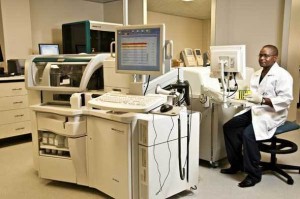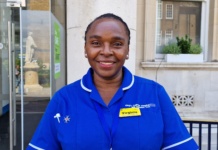A BIRMINGHAM hospital has gained major international recognition for its work in helping to save lives in Africa.
The kidney unit at the Queen Elizabeth Hospital (QE) has been instrumental in developing vital links with a hospital in Ghana for the past five years – during which time a life-saving dialysis programme has begun for children and pregnant women.
Now, the University Hospitals Birmingham NHS Foundation Trust, (UHB) of which the 1,200-bed QE is a vital part, has become only the second trust in the UK to be awarded ‘Level A’ status in the Sister Renal CentRE (SRC) run by the International Society of Nephrology, which aims to enhance co-operation between kidney units worldwide.
The scheme encourages the pairing of sister centres between the developed and the developing world, with the aim of setting up kidney dialysis treatment, training specialist staff such as pathologists, doctors and dialysis nurses – in some areas treatment has become advanced enough for transplant operations.
The Birmingham trusts Level A status, which involves ongoing work with the Korle Bu Hospital in Accra, comes with American $17,000 to further develop the programme. Another hospital in the city of Kamasi, 250 km north-west of Accra, will also be involved.
All medical staff in Birmingham involved in the programme give their time free, while funding from the ISN goes towards things such as travel costs.
Dr Graham Lipkin, a nephrology consultant in Birmingham, said: “UHB is now probably the biggest individual kidney service in the NHS, transplanting around 150-160 kidneys a year and caring for more than 1,000 patients on dialysis.
“But globally, kidney disease is a major health problem, with a three to five-fold increase in Africa compared to what we see here. In Ghana there was very little co-ordinated care and a lot of people are dying with acute kidney failure for lack of short term dialysis and funding.
“What I found particularly distressing when I went there was there was no dialysis facility for children, but thanks to the SRC programme, the first children with acute kidney failure are receiving dialysis in Ghana.”
UHB began by training a kidney specialist who spent more than a year in Birmingham before returning to Accra.
The scheme was further boosted by the work of former UHB specialist Dr Jo Adu, a Ghanaian, who retired back to Accra about two years ago.
Dr Lipkin added: “There are now well developed clinics for seeing people with chronic kidney disease in Accra, and a research programme has started to develop ways of looking at the causes of chronic kidney disease in Ghana.
“We supported the first kidney transplants in the country and, linking with the TLC charity through my colleague Andrew Ready, we have had three successful transplant visits to Ghana over the last two and a half years.”
Other key developments have been the introduction of high speed web connection so the team in Accra can present a difficult case over the internet and then discuss it.
Dr Lipkin is adamant that UHB has gained as much, if not more, than Ghana by taking part in the SRC programme.
“There are major benefits to our trust. Our visits to Ghana help team building, are highly educational and enable our staff to experience disease they would not normally be dealing with. There is also amazing potential at this end for major research between the two centres.”










